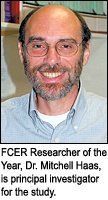It’s a new year and many chiropractors are evaluating what will enhance their respective practices, particularly as it relates to their bottom line. One of the most common questions I get is: “Do I need to be credentialed to bill insurance, and what are the best plans to join?” It’s a loaded question – but one every DC ponders. Whether you're already in-network or pondering whether to join, here's what you need to know.
Western States Receives $2.8 Million Research Grant
Western States Chiropractic College (WSCC) in Portland, Ore., has been awarded a $2.8 million grant from the National Center for Complementary and Alternative Medicine to study the treatment of low back pain.
The grant is the largest ever awarded by the NCCAM for a single-study project.

Western States has an extensive research history, including numerous grants from the NCCAM, a branch of the National Institutes of Health (NIH). Serving as principal investigator on the current study is WSCC Dean of Research, Mitchell Haas, DC, MA. The Foundation for Chiropractic Education and Research (FCER) recently named Dr. Haas, Researcher of the Year for 2006. Vincent P. Lucido, DC, foundation president, presented Dr. Haas with the award at the Conference for Chiropractic Research in Chicago, Sept. 15-16, 2006.
"What has distinguished Mitchell Haas has been not only his ingenuity for building and maintaining a high level of research activity for several years with federal support," said FCER Director of Research and Education, Anthony L. Rosner, PhD, "but [also] his substantial contributions in such diverse areas as evaluating the reliability of titration, cost-effectiveness, and dose-response effects of manipulation."
"His persistent efforts in building a network of medical and chiropractic providers as a rich source of data are an inspiration to researchers and practitioners alike," added Dr. Rosner.
In addition to his role as WSCC dean of research, Dr. Haas is an adjunct associate professor in the Department of Neurology, School of Medicine at Oregon Health and Sciences University. Among his substantial accomplishments in the field of chiropractic research, he was one of the first chiropractic researchers to earn grants through the NCCAM. He has been published extensively in peer-reviewed literature and is a regular presenter at FCER research conferences.
A member of the research division at WSCC (his alma mater) since 1987, Dr. Haas served as co-investigator on the first federal research grant ever awarded to a chiropractic college: "Low Back Pain Practice Activities and Patient Outcomes." Overall, he has served as principal or co-investigator on approximately 20 extramurally funded grants, bringing more than $3 million in research funding to the college. Currently, he is a co-investigator on two NIH-funded complementary and alternative medicine (CAM) centers: the Oregon Center for CAM in Craniofacial Disorders and the Oregon Center for CAM in Neurological Disorders.
Dr. Haas received the Distinguished Service Award from the American Public Health Association (APHA) in 1997, in recognition of his efforts to establish the Chiropractic Health Care Section within the APHA. After chairing the application committee that achieved section status, he served as chair of the CHC section, chair of the APHA Intersection Council, a governing councilor, and member of the APHA Executive Board. Recently, Dr. Haas was elected president of the Oregon Public Health Association; he has served on the executive board of the association since 2002.
"It is an honor to receive this recognition from FCER," said Dr. Haas. "It is the hope of all researchers to be able to make a significant contribution to the profession and our patients. In my 20 years as a clinical scientist, I have seen great expansion in the chiropractic research endeavor and a steady increase in the quality and sophistication of our work. The importance of chiropractic research to the health of the public and informing public policy is clearly indicated by dedicated funding by [the Health Resources Services Administration] since 1994 and the expanding opportunities and funding through NIH. I look forward to our ongoing effort to evaluate the efficacy of chiropractic care, identify mechanisms, and ultimately improve chiropractic practice and the health of our patients."
In winning the FCER Researcher of the Year award, Dr. Haas joins a distinguished group of researchers honored in kind; past recipients include John Triano, DC, PhD; Reed Phillips, DC, PhD; William Meeker, DC, MPH; Patricia Brennan, PhD; Howard Vernon, DC, PhD; Joanne Nyiendo, PhD; Akio Sato, MD, PhD; Dana Lawrence, DC; Niels Nilsson, DC, MD, PhD; Scott Haldeman, DC, MD, PhD; and Cheryl Hawk, DC, PhD.



